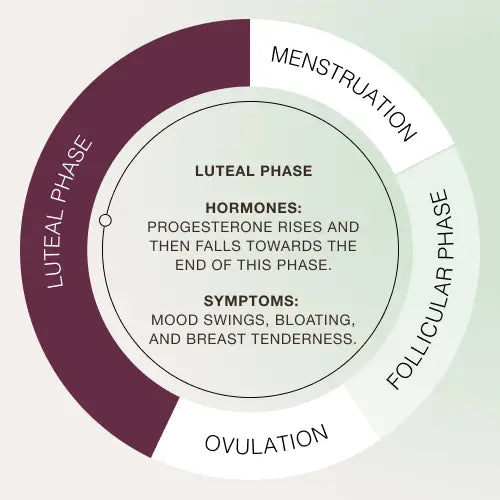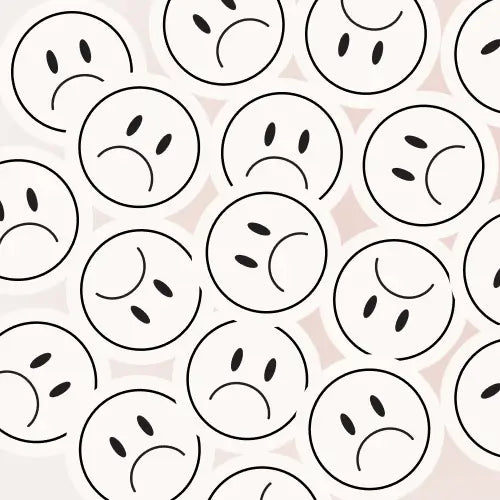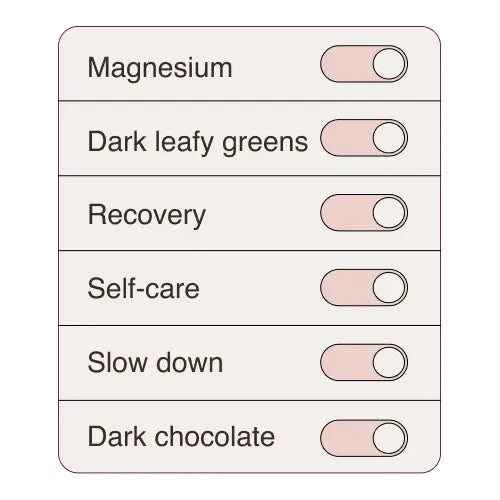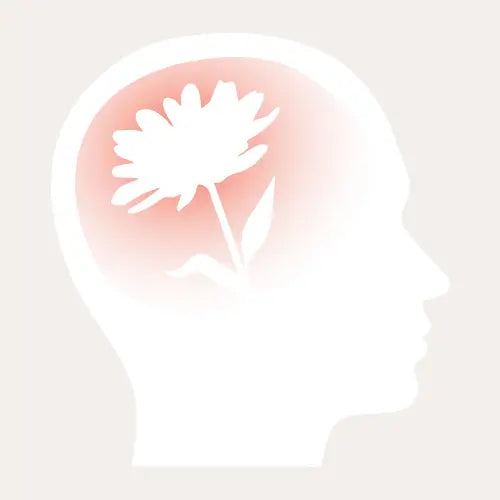The science of Happier Cycles
Apart from the fact that we have periods, few of us will have grown up with the knowledge of how the menstrual cycle actually works and how important each phase is to our overall health and well being! Here are just a few tips on how to optimise your current cycle phase, but this is only one piece of the period health puzzle…
Keep your eyes on your inbox in the coming weeks as we’ll be moving through your cycle with you and sharing advice from our holistic menstrual health handbook.
Your Current Phase:
Luteal
Autumn
What's happening?
It sounds like you might be in your luteal phase right now! The time between ovulation and your next period is known as your luteal phase - or Autumn - but you may know it as your pre-menstrual time.
Timescale:
Typically occurs around day 14 of the cycle.
Symptoms:
Mood swings, bloating, and breast tenderness.

So what’s going on in your body right now?
After ovulation, your body essentially thinks you could be pregnant. The newly released egg (now known as the corpus luteum) will start to produce the hormone progesterone - and the main job of progesterone is to support early pregnancy.
After a week or so the egg and the follicle will break down - signalling to the body that there is no baby and that the womb lining is not needed aka it’s time for your period.
Once the egg breaks down your progesterone and oestrogen levels will take a dip. This is what triggers your next bleed and can also cause PMS symptoms if the dip is too dramatic.

In your luteal phase, progesterone is the dominant hormone. If Oestrogen is the Beyonce of the hormone world, progesterone is more of a Billie Eilish. Introverted, yet straight talking and slightly lower energy. After all, progesterone is hanging around hoping for a pregnancy, so it wants you to stay at home, be safe and avoid risks!
We deal with a few hormonal ups and downs during our luteal phase - the initial drop of oestrogen after ovulation and then the drop of both progesterone and oestrogen before our period arrives.
These hormonal fluctuations can trigger mood swings and PMS symptoms like bloating or skin breakouts - and if you’re a little more sensitive than usual, that’s ok. However, extreme drops in mood or feelings of anxiety or depression could be a sign of a hormonal imbalance or PMDD (Premenstrual dysphoric disorder) - and is worth talking to a doctor about.

Movement
Exercise can definitely be really helpful during your luteal phase - it can boost your mood, relieve bloating and even help with PMS cramping, but remember to listen to your body - if you’re not feeling super energetic, don’t push yourself!
Around this time of your cycle, your body temperature naturally rises. You probably won’t notice it but it can mean you get hotter a lot faster when doing intense cardio - and this can make you feel exhausted faster too. You can definitely still do the exercise you love around this time, but just be aware that if your performance dips slightly, it’s likely down to your lower energy levels rather than your abilities!
Nutrition
We tend to be more hungry in our luteal phase and with good reason - our bodies are pretty busy!
Whilst you may get cravings for sugary or fried foods, try to keep things balanced as these foods can trigger inflammation which could make period pain more intense once your bleed arrives.
A healthy diet rich in whole foods, specifically packed with vitamins B6, B12, D, and C and magnesium can help to manage PMS symptoms of irritability, anxiety and fatigue by keeping your hormones smooth and balanced. Reach for foods like dark leafy green, complex carbohydrates and oily fish like salmon - and if you do have sweet cravings dark chocolate is full of magnesium!
When it comes to drinking, if you find that alcohol impacts your mood (it is a depressant after all) it might be a good idea to swap your wine for a kombucha during this time. - so that’s plenty of fruit and vegetables as well as foods rich in omega-3 fatty acids, such as salmon.

If you are struggling with low mood in the lead-up to your period, be sure to do everything you can to support your mental well-being. Take it easy but be sure to make time for things that make you feel good - whether that’s catching up with a friend, reading your favourite book or simply cleaning the house so you can enjoy a calming environment.
In this phase of our cycle, we don’t tend to deal with overwhelm well - how can you slow the pace of life down? Are there things you can say no to or tasks you can ask for help with?
The Science of Your Cycle

So what’s going on in your body right now?
After ovulation, your body essentially thinks you could be pregnant. The newly released egg (now known as the corpus luteum) will start to produce the hormone progesterone - and the main job of progesterone is to support early pregnancy.
After a week or so the egg and the follicle will break down - signalling to the body that there is no baby and that the womb lining is not needed aka it’s time for your period.
Once the egg breaks down your progesterone and oestrogen levels will take a dip. This is what triggers your next bleed and can also cause PMS symptoms if the dip is too dramatic.
How you might be feeling

In your luteal phase, progesterone is the dominant hormone. If Oestrogen is the Beyonce of the hormone world, progesterone is more of a Billie Eilish. Introverted, yet straight talking and slightly lower energy. After all, progesterone is hanging around hoping for a pregnancy, so it wants you to stay at home, be safe and avoid risks!
We deal with a few hormonal ups and downs during our luteal phase - the initial drop of oestrogen after ovulation and then the drop of both progesterone and oestrogen before our period arrives.
These hormonal fluctuations can trigger mood swings and PMS symptoms like bloating or skin breakouts - and if you’re a little more sensitive than usual, that’s ok. However, extreme drops in mood or feelings of anxiety or depression could be a sign of a hormonal imbalance or PMDD (Premenstrual dysphoric disorder) - and is worth talking to a doctor about.
How to nourish your body

Movement
Exercise can definitely be really helpful during your luteal phase - it can boost your mood, relieve bloating and even help with PMS cramping, but remember to listen to your body - if you’re not feeling super energetic, don’t push yourself!
Around this time of your cycle, your body temperature naturally rises. You probably won’t notice it but it can mean you get hotter a lot faster when doing intense cardio - and this can make you feel exhausted faster too. You can definitely still do the exercise you love around this time, but just be aware that if your performance dips slightly, it’s likely down to your lower energy levels rather than your abilities!
Nutrition
We tend to be more hungry in our luteal phase and with good reason - our bodies are pretty busy!
Whilst you may get cravings for sugary or fried foods, try to keep things balanced as these foods can trigger inflammation which could make period pain more intense once your bleed arrives.
A healthy diet rich in whole foods, specifically packed with vitamins B6, B12, D, and C and magnesium can help to manage PMS symptoms of irritability, anxiety and fatigue by keeping your hormones smooth and balanced. Reach for foods like dark leafy green, complex carbohydrates and oily fish like salmon - and if you do have sweet cravings dark chocolate is full of magnesium!
When it comes to drinking, if you find that alcohol impacts your mood (it is a depressant after all) it might be a good idea to swap your wine for a kombucha during this time. - so that’s plenty of fruit and vegetables as well as foods rich in omega-3 fatty acids, such as salmon.
How to nourish your mind

If you are struggling with low mood in the lead-up to your period, be sure to do everything you can to support your mental well-being. Take it easy but be sure to make time for things that make you feel good - whether that’s catching up with a friend, reading your favourite book or simply cleaning the house so you can enjoy a calming environment.
In this phase of our cycle, we don’t tend to deal with overwhelm well - how can you slow the pace of life down? Are there things you can say no to or tasks you can ask for help with?
Your holistic menstrual health toolkit






